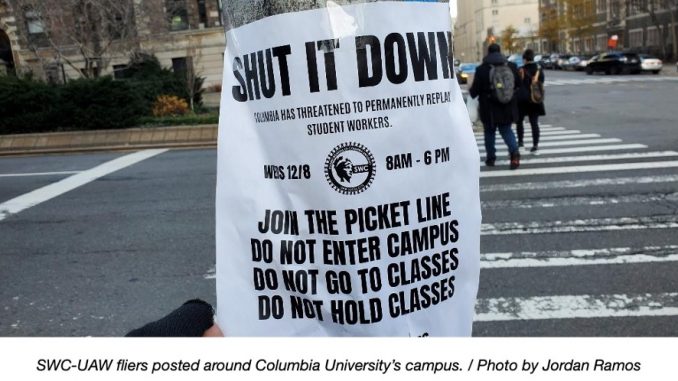
By JOHAN ABDU and JORDAN RAMOS
It’s been weeks into the strike against Columbia University, conducted by unionized student workers who are demanding a living wage, dental and health insurance and support against discrimination and sexual harassment on campus. The Brooklyn News Service was on campus Thursday morning as the protest entered its sixth week. (Columbia University’s endowment is listed at over $14 billion dollars.)
Despite this being one of the biggest organized protests currently in America, this strike hasn’t been huge news.
The Student Workers of Columbia-United Auto Workers Local 2110 (SWC-UAW) is the labor union behind these protests that began back in mid-March. Formed in 2016, the union wasn’t officially recognized by Columbia University until 2019, when negotiations over labor contracts began.
Disagreements between the two side prevented an agreement from being finalized.
The strike had been stalled due to the COVID-19 pandemic, but it resumed in November and is now reaching a boiling point, as an email from campus administrators was sent out to union members, stating that they will ultimately be replaced if the strike persists.
“Tonight we received an email from HR threatening to withhold some appointment letters for the Spring semester if we do not end our strike by December 10th,” the SWC-UAW posted on its website.
The SWC-UAW further declared that the threat from the university is illegal and that the protest is working. “Make no mistake that this threat is a form of retaliation and intended to break the power of our strike,” workers wrote. “It also shows that our strike is working and the university is desperate to end it.”
A protester on campus, who asked for anonymity, explained to the Brooklyn News Service what the key demands are for the union.
“In our contract [in negotiation], we are asking for four key items…One of them is a living wage in New York City, in agreement with a living wage that Columbia itself has calculated for the city.”
Currently, the legal minimum wage is $15 an hour, but that can be slightly higher for highly educated student workers. Many argue that the $15 minimum isn’t enough to cover the living expenses of student workers New York City. The union is asking for a wage increase to $26 an hour.
Many students have come out publicly since the beginning of the protests, sharing stories of struggling to teach with an ever-growing list of demands.
The unnamed protester who spoke to the Brooklyn News Service said that the National Labor Relations Board (NLRB), the governmental body responsible for enforcing U.S. labor law in relation to collective bargaining and unfair labor practices, recognizes all student workers at Columbia. The protester said the administration has “tried to exclude undergraduate workers from our union” to limit benefits that graduate students would exclusively receive.
As protesters shouted on Columbia’s campus about the injustice of the university’s controversial email, it was more and more clear that strikers will not be swayed. They are preparing to file a Unfair Labor Practices charge against the school if a contract is not agreed upon.
“We know this can be an incredibly anxiety-provoking email to receive, and that is [Columbia’s] intention,” wrote the SWC-UAW. “Our strength is in our collective power, and it is critical that we hold the line.”
(Related breaking story: “Starbucks workers in Buffalo win watershed union vote”)
